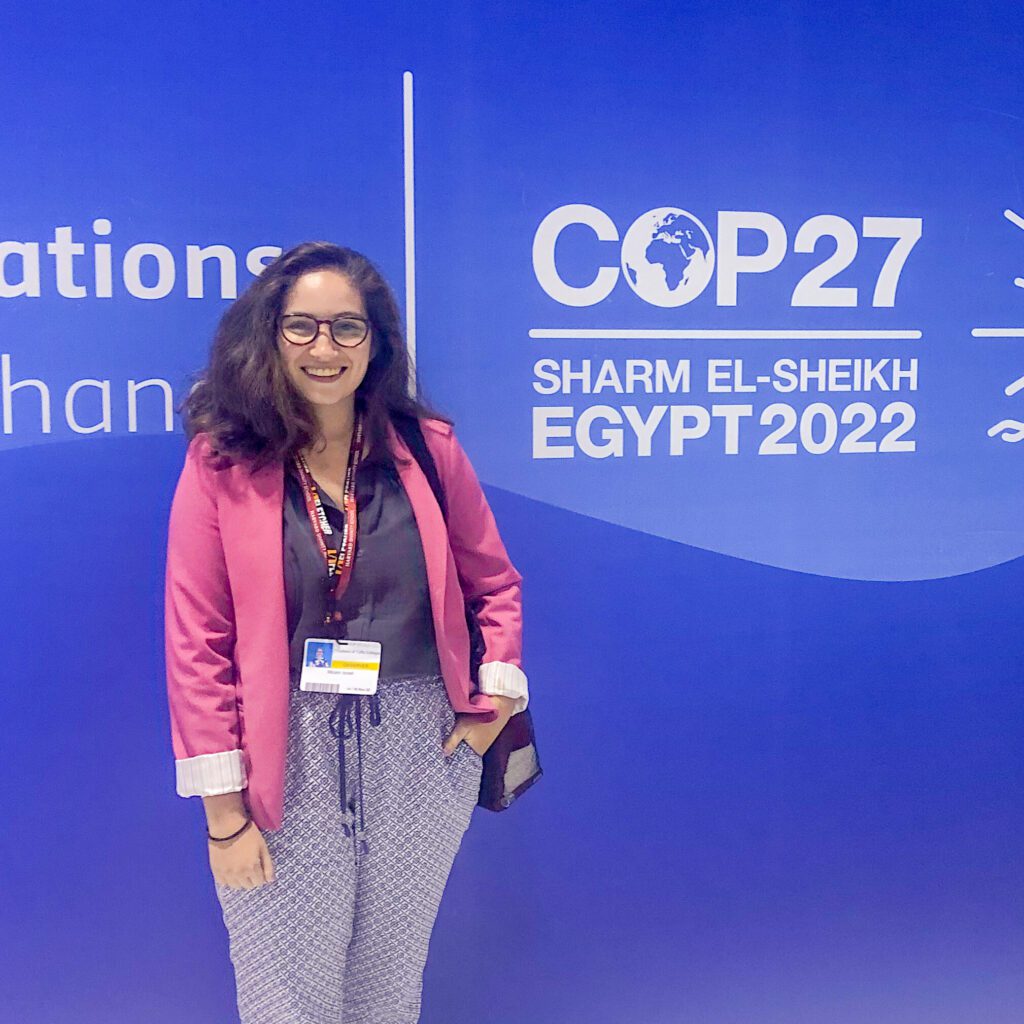
Miriam Silverman Israel
COP27 A Reflection
By: Miriam Silverman Israel
No matter how much information you have beforehand, nothing can entirely prepare you for the experience of attending a COP conference. The scale of the event—with thousands of attendees, hundreds of events every day, and seemingly infinite negotiations—is overwhelming, inspiring, and frustrating all at once. It can feel like the many pavilions, side events, and networking opportunities are a distraction from the real work of technical negotiations, to which many attendees aren’t even paying close attention.
At the same time, while attending the second week of the conference, I met numerous dedicated advocates and organizations working tirelessly to meet with delegates and to encourage them to prioritize key issues and agree on specific language. These observers also played a critical role holding negotiators accountable, and in ensuring that the discussion process was transparent and accessible to those not in attendance.
At Harvard Divinity School, my focus has largely been on the role of religious actors in climate policy and action. While at COP27 I was excited to meet observers from faith-based organizations and learn more about their role in the negotiation process.
While there, I was also closely tracking the progress on a historical international agreement on funding for loss and damages. The second week of COP27 was a hectic rush to finish negotiations on this important agreement which advances the idea that developed countries should provide financial support to developing countries, who bear the brunt of environmental impacts. Although a painstaking process, the final agreement establishes a direct funding mechanism for Loss and Damage which will be crucial to ensuring climate justice and protecting the most vulnerable communities around the world. Observing these negotiations revealed to me the need for outside advocacy to put pressure on negotiators, and the important role of faith-based organizations in this work.
By being present at COP27, faith-based organizations were able to elevate discussions around the moral and spiritual dimensions of the climate crisis and used their voices to emphasize the historic injustices of climate change. Organizations from across religious and spiritual traditions were represented at COP27, and they often implemented different strategies to reach delegates and attendees alike.
For example, I was able to partake in a daily interfaith meditation held in one of the main courtyards of the venue. During this meditation attendees shared reflections and prayers related to a common daily theme. Participants shared teachings from their own traditions, or their own thoughts based on the various conference proceedings of that day. Holding the gathering in a public place allowed passersby to join in or linger for a few minutes, spreading the idea that spiritual care is also an important part of climate action.
An exciting highlight of the conference was being invited to attend a meeting with the negotiating team of the Holy See. The Vatican only recently became a full voting member and party to the Paris Agreement, and their delegates were soliciting input and priorities from Catholic and other civil society organizations who were present at COP. Repeatedly, representatives from around the world stressed the need for an agreement on loss and damage funding and to maintain a target goal of limiting global warming to 1.5 degrees Celsius. The influence that faith-based organizations can have when they are vocal, well-organized, and advocating for climate justice is invaluable.
COP27 was a place of frustrating contradictions, but I am inspired by the activists I met, whether indigenous people, youth advocates or religious leaders who are committed to climate justice and a livable planet for future generations. Despite the technical and complex nature of the negotiations, it is possible to see groundbreaking progress on issues like loss and damage. The presence of advocates, included faith-based organizations, can have a transformative effect on the negotiation outcomes and be an example for an inclusive, equitable and sustainable future.
Miriam Silverman is a candidate for a Masters of Theological Studies at Harvard Divinity School with a Concentration in Religion, Ethics and Politics and International Environmental Policy. She is also pursuing a Masters of Law and Diplomacy at the Fletcher School, Tufts University.
The Salata Institute
The Salata Institute supports interdisciplinary research that leads to real-world action, including high-risk/high-reward projects by researchers already working in the climate area and new endeavors that make it easier for Harvard scholars, who have not worked on climate problems, to do so. Faculty interested in the Climate Research Clusters program should note an upcoming deadline for concepts on April 1, 2024.
